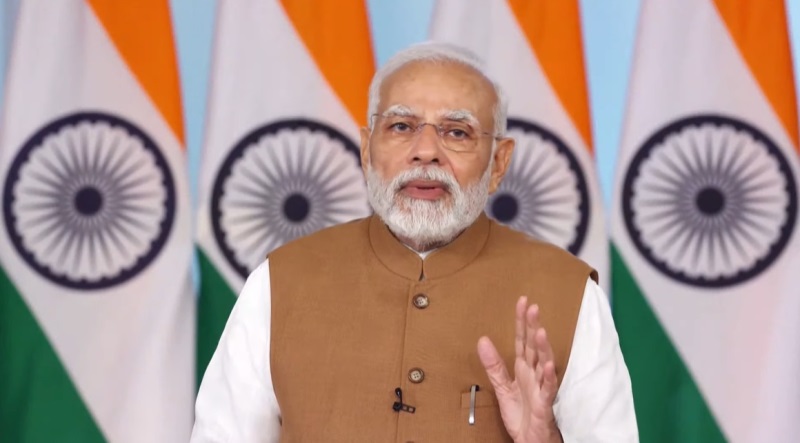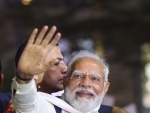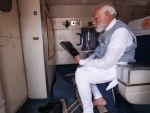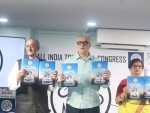 PM Modi
PM Modi 'Entire country experiencing power of Jan Dhan bank accounts': PM Modi launches 75 Digital Banking Units across India
New Delhi/IBNS: Prime Minister Narendra Modi dedicated 75 Digital Banking Units (DBU) across 75 districts to the nation via video conferencing.
Addressing the gathering, the Prime Minister started by stressing that the 75 Digital Banking Units (DBU) will further financial inclusion and enhance the banking experience for citizens.
“DBU is a big step in the direction of Ease of Living for the common citizens," he said.
The Prime Minister informed that in such a banking setup, the government aims to provide maximum services with minimum infrastructure, and all of this will happen digitally without involving any paperwork. It will also simplify the banking procedure while also providing a robust and secure banking system.
“People living in small towns and villages will find benefits like transferring money to availing loans. Digital Banking Units are another big step in that direction which is going on in the country to make the life of common man of India easier," he added.
PM Modi said that the aim of the government is to empower the common citizen and make them powerful, and as a result, policies were made keeping in mind the last person and the entire government moving in the direction of their welfare.
He pointed out the two areas in which the government worked simultaneously. First, reforming, strengthening, and making the banking system transparent, and secondly financial inclusion.
Recalling the traditional ways of the past where people had to go to the bank, the Prime Minister said that this government transformed the approach by bringing the bank to the people.
“We have given top priority to ensure that banking services reach the last mile. This a huge change from the days when it was expected that poor will go to the bank to a scenario when the banks were going on the doorstep of the poor. This involved reduction of distance between the poor and the banks. “We not only removed the physical distance but, most importantly, we removed the psychological distance.”
The highest priority was given to covering far-flung areas with banking.
The Prime Minister informed that today more than 99 per cent of villages in India have a bank branch, banking outlet or a ‘banking mitra’ within a 5 km radius.
“Extensive Post Office network too was harnessed via India Post Banks for providing the banking needs to the common citizens”, he said.
“Today the number of branches per one lakh adult citizens in India is more than countries like Germany, China and South Africa," he added.
Today, 75 Digital Banking Units are being launched across India. This is a step in the direction of significantly improving the banking experience for each and every citizen of the country.
— PIB India (@PIB_India) October 16, 2022
- Prime Minister @narendramodi pic.twitter.com/yhObpzjIOE
Despite initial misgivings in certain sections, the Prime Minister said, “Today the entire country is experiencing the power of Jan Dhan Bank accounts.”
He informed that these accounts enabled the government to provide insurance to the vulnerable at a very low premium.
“This opened the way for loans for the poor without collateral and provided Direct Benefit Transfer to the accounts of the target beneficiaries. These accounts were the key modality for providing homes, toilets, gas subsidy, and benefits of schemes for farmers could be ensured seamlessly," he said.
The Prime Minister acknowledged the global recognition for India’s digital banking infrastructure.
“The IMF has praised India's digital banking infrastructure. The credit for this goes to the poor, farmers and labourers of India, who have adopted new technologies, made it a part of their lives," he emphasised.
“UPI has opened up new possibilities for India,” the Prime Minister continued, “When financial partnerships are combined with digital partnerships, a whole new world of possibilities opens up. A huge example of UPI is before us. India is proud of this as it is the first technology of its kind in the world.”
He informed that today 70 crore indigenous Rupay cards are in operation, a vast change from the days of foreign players and the elite nature of such products.
“This combination of technology and economy is enhancing the dignity and affordability for the poor and empowering the middle class, while at the same time it is also eliminating the digital divide of the country," he said.
PM Modi also praised the role of DBT in eliminating corruption and said that more than 25 lakh crore rupees have been transferred in various schemes via DBT. He informed me that he will transfer the next instalment to the farmers tomorrow.
“Today the whole world is appreciating this DBT and the digital power of India. Today it is being seen as a global model. The World Bank has even gone so far as to say that India has become a leader in ensuring social security through digitization," said the Prime Minister.
The Prime Minister informed that fintech is at the heart of India's policies and efforts, and it is playing a key role in shaping the future. Digital banking units will further expand this capability of fintech.
“If Jan Dhan accounts had laid the foundation of financial inclusion in the country, then Fintech would form the basis of a financial revolution," he said.
Referring to the government’s announcement of the launch of a digital currency based on blockchain technology, the Prime Minister pointed out that: "Be it digital currency in the coming times, or digital transactions in today's time, apart from the economy, many important aspects are associated with them."
He listed the savings, elimination of the hassle of physical currency and environmental benefits as key advantages.
The Prime Minister pointed out that paper and ink for currency printing are imported, and by adopting a digital economy we are contributing to a self-reliant India while also benefiting the environment by reducing the consumption of paper.
Support Our Journalism
We cannot do without you.. your contribution supports unbiased journalism
IBNS is not driven by any ism- not wokeism, not racism, not skewed secularism, not hyper right-wing or left liberal ideals, nor by any hardline religious beliefs or hyper nationalism. We want to serve you good old objective news, as they are. We do not judge or preach. We let people decide for themselves. We only try to present factual and well-sourced news.







